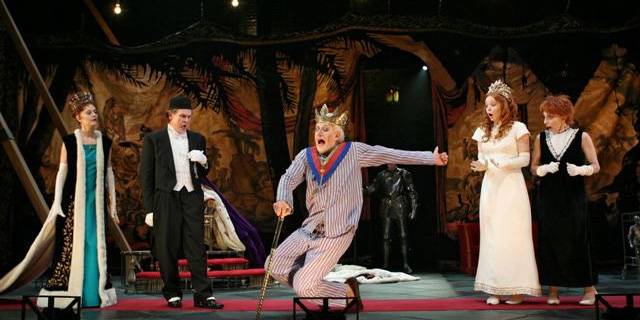There are many reasons why you should see Exit the King, but foremost among them is the opportunity to see a brilliant physical comic performance by Geoffrey Rush. My companion at the show is an alumnus of L’École Internationale de Théâtre Jacques Lecoq, and he told me that the reason he was particularly excited to see this show is that Rush is an alumnus as well.
The training shows. Rush moves with the grace and precision of the greatest clowns and the greatest dancers. Yet behind the pratfalls and silly walks are a gravity and depth that signify the presence of an accomplished dramatic actor. Rush’s King Berenger is on the precipice between comedy and tragedy, and though we laugh a lot throughout Exit the King, much of the time we laugh because otherwise we would cry.
The play itself, a later work by Eugene Ionesco that has been newly adapted by Rush and director Neil Armfield, is a remarkable hybrid. The helpless absurdism of the playwright’s earlier works (such as The Chairs and Rhinoceros) is always in evidence, but it’s at war with the weary hopefulness of Beckett’s Waiting for Godot and even the celebration of mankind’s indomitability found in a play like Wilder’s The Skin of Our Teeth. Exit the King is about an old, dilapidated monarch whose kingdom and life are in ruins after too much profligate everything (the king is credited with numerous epoch-making accomplishments at one point in the play; it’s no coincidence that the last named of these is the splitting of the atom.) His wife and his doctor pronounce, near the beginning of the show, that the king will be dead by the time the play ends, in 90 minutes. And so the play is a death march (literally so in its harrowing but touching final moments). Berenger clings to life though he’s squandered all of its gifts and can bear no more of its trials.
And yet, all this serious subject matter notwithstanding, the play feels mostly like a hilarious comedy. Rush stands as its brilliant center, but he’s abetted by—with one exception—a splendid cast. Brian Hutchison plays the kingdom’s last remaining soldier (in a full suit of unwieldy armor); his dogged loyalty to whomever is in command is endearing and satirical at the same time. William Sadler, a fez incongruously atop his head, is oily and cold-hearted as the doctor, and yet we understand and even empathize a little with him. Lauren Ambrose plays the king’s young and lovely second wife; she’s essentially the straight woman in this play full of broad comic portraits and she holds her own compellingly.
Andrea Martin deserves her own paragraph as Juliette, who is both the only remaining servant in the royal household and King Berenger’s nurse. Martin is terrific in the best Broadway role she’s ever had, one that allows her truly to showcase her comic agility and range. My favorite scene in this production is one between Martin and Rush: he has accepted his mortality at this point, but he’s fighting it by reflecting on the trivial joys that comprise the moments of every day. She, as his long-suffering nurse (and stand-in for all the ordinary working people in the world), doesn’t understand why he’s so touched by the idea of going to the grocer to buy vegetables, let alone waking up too early in the morning after not getting enough sleep the night before. The interplay of these two giant stage personalities illuminates the wisdom of this scene.
The sixth cast member is arguably the most famous—Susan Sarandon, who plays the king’s first and more pragmatic wife, Queen Marguerite. Sarandon is radiant, but alas she’s never the commanding figure that the role calls for. The play’s ending suffers a bit for her lack of potency.
But overall this is a triumphant presentation. Armfield’s staging is jokey and fourth-wall bashing without feeling postmodernly ironic; there is heart in this play, everywhere. Dale Ferguson’s deliberately overdone sets and costumes are of a piece with the work’s sensibility. Damien Cooper’s lighting, Russell Goldsmith’s sound design, and John Rogers’s music (some of which is performed live—Shane Endsley and Scott Harrell alternate as trumpeter) support the world of the piece still further.
Rush’s larger-than-life performance at the center of this Exit the King will probably be the one I cherish longest and most from this Broadway season. I feel privileged to have been able to see a truly fine actor at the peak of his powers. This is a production not to be missed by fans of great theatre!
